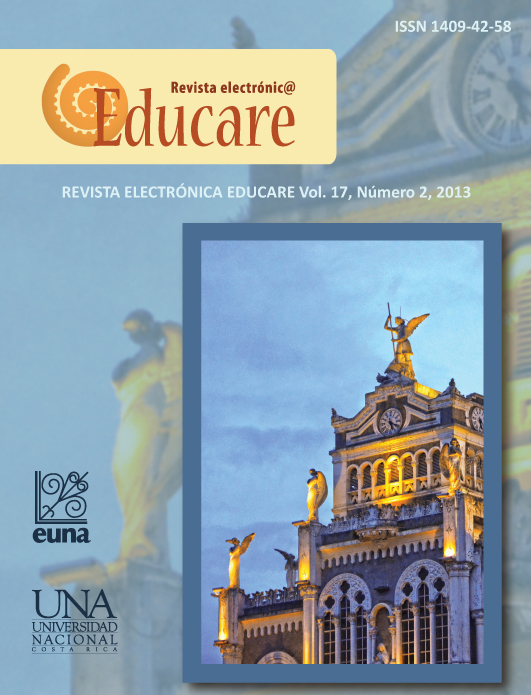Ethical Perspective of Biopedagogical Mediation
DOI:
https://doi.org/10.15359/ree.17-2.7Keywords:
Mediation, Bio-pedagogy, life, education, ethics, solidarity, responsibility, dialogue, coexistence, communication, relationships, learningAbstract
This essay addresses the ethical perspective of biopedagogical mediation considering the importance of placing education in an alternative paradigm where both pedagogy and life complement each other to attend the freeing process of education. The main goal is to contribute to the meditation and action towards pedagogical mediation and its inherent bond to ethics. The article is based on the premise that there is a need to nourish principles and values that exalt life´s multidimesionality and complexity. Education, as a political proyect, has the challenge to prepare a planetary citizenship; a shared effort that brings every human being to work for a real mindful and social transformation in order to reach higher states of personal and social wellness. It is required to direct both energy and wisdom to visualize the, so demanded by the planet, human tranformation.
References
Alvarado, E. (2007). Educación, ecología y economía: Pasos hacia otra epistemología. Costa Rica:
Alma Mater.
Assman, H. (2002). Placer y ternura en educación. Hacia una sociedad aprendiente. Madrid: Narcea.
Bateson, G. (1993). Espíritu y naturaleza. Buenos Aires: Amorrurto
Boff, L. (1996). Ecología: Grito de la tierra, grito de los pobres. Madrid: Trota.
Boff, L. (2004). Ética planetaria desde el Gran Sur. México: Dabar.
Bohn, D. (1997). Sobre el diálogo (2ª ed., Trad. D. González y F. Mora). Barcelona: Kairós.
Castillo, I. y Marín, C. (junio, 2009). Hacia una visión holística de la educación universitaria: El
amor y el caos un proceso creativo para el aprendizaje. Revista Electrónica Educare, 13(1),
-143. Recuperado de http://www.revistas.una.ac.cr/index.php/EDUCARE/article/
view/1481
De Souza, B. (2009). Una epistemología del sur. La reinvención del conocimiento y la emancipación
social. México: Siglo XXI.
Fradera, M. y Guardans, T. (2008). La séptima dirección. El cultivo de la interioridad. Barcelona:
(CETR)
Freire, P. (2011). La educación como práctica de la libertad. Buenos Aires: Siglo veintiuno.
Fried, R. (2001). La pasión de aprender. Santiago: Cuatro vientos.
Gutiérrez, F. (2004). Pedagogía del aprendizaje. Guatemala: USAC.
Hernández, S. M. (2010). Educación y ética. Sociológica, 25(72), 215-227. Recuperado de http://
scielo.unam.mx/pdf/soc/v25n72/v25n72a10.pdf
Maturana, H. (2002). Transformación en la convivencia. Santiago: Dolmen.
Morin, E. (1999). Los siete saberes necesarios para la educación del futuro. París: UNESCO.
Osorio, J. y Weinstein, L. (1995) El corazón del arco iris: Lecturas sobre nuevos paradigmas en
educación y desarrollo. Santiago: CEAAL
Pasillas, M. A. (2005). Violencia, ética y pedagogía. Revista Mexicana de investigación educativa.
(27), 1149-1164. Recuperado de http://www.redalyc.org/articulo.oa?id=14002711
Downloads
Published
How to Cite
Issue
Section
License
1. In case the submitted paper is accepted for publication, the author(s) FREELY, COSTLESS, EXCLUSIVELY AND FOR AN INDEFINITE TERM transfer copyrights and patrimonial rights to Universidad Nacional (UNA, Costa Rica). For more details check the Originality Statement and Copyright Transfer Agreement
2. REUTILIZATION RIGHTS: UNA authorizes authors to use, for any purpose (among them selfarchiving or autoarchiving) and to publish in the Internet in any electronic site, the paper´'s final version, both approved and published (post print), as long as it is done with a non commercial purpose, does not generate derivates without previous consentment and recognizes both publisher's name and authorship.
3. The submission and possible publication of the paper in the Educare Electronic Journal is ruled by the Journal’s editorial policies, the institutional rules of Universidad Nacional and the laws of the Republic of Costa Rica. Additionally, any possible difference of opinion or future dispute shall be settled in accordance with the mechanisms of Alternative Dispute Resolution and the Costa Rican Jurisdiction.
4. In all cases, it is understood that the opinions issued are those of the authors and do not necessarily reflect the position and opinion of Educare, CIDE or Universidad Nacional, Costa Rica. It is also understood that, in the exercise of academic freedom, the authors have carried out a rogorous scientific-academic process of research, reflection and argumentation thar lays within the thematic scope of interest of the Journal.
5. The papers published by Educare Electronic Journal use a Creative Commons License:














 The articles published by Educare Electronic Journal can be shared with a Creative Commons License:
The articles published by Educare Electronic Journal can be shared with a Creative Commons License: 



